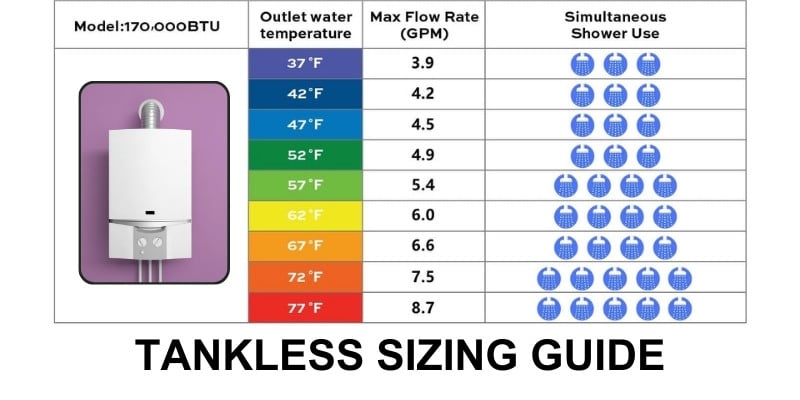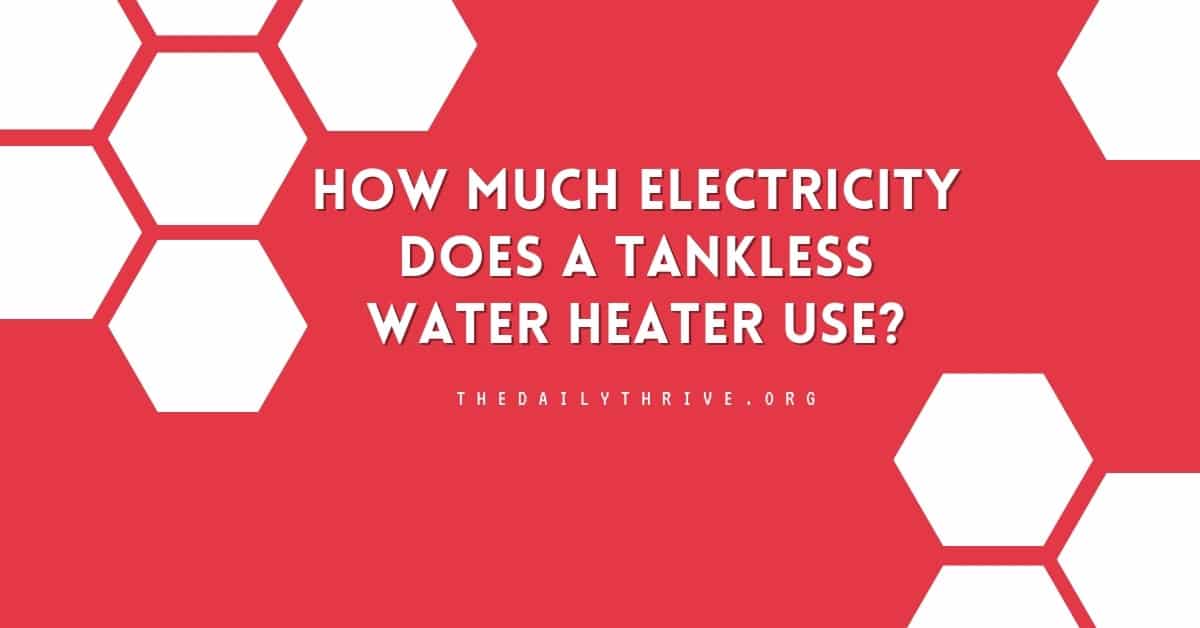Modern living brings with it a multitude of conveniences. Among them, tankless water heaters stand out for their ability to provide on-demand hot water. But how much electricity do they consume? Let’s dive deep and demystify the numbers.
Tankless Water Heaters: A Quick Overview
Tankless water heaters, or on-demand or instantaneous water heaters, have revolutionized how modern households use and conserve energy. Their prime function is to provide hot water only as needed, negating the requirement for a storage tank.
Here’s a brief on how they operate.
As the name suggests, tankless water heaters heat water directly without using a storage tank. When you turn on the hot water tap, cold water travels through a pipe and gets heated either by an electric element or a gas burner. This ensures a constant hot water supply without waiting for a storage tank to fill up. This on-demand system distinguishes them from traditional heaters and eliminates standby energy losses associated with storage water heaters.
Advantages of going tankless:
- Space-Saving: They’re compact and can be mounted on walls, freeing up valuable floor space.
- Reduced Standby Losses: Unlike traditional water heaters that constantly keep water heated, tankless heaters only heat water on demand, thereby eliminating standby energy losses.
- Longer Lifespan: They generally last longer than tank systems, often over 20 years, with proper maintenance.
How Much Does It Cost to Run an Electric Tankless Water Heater?
While individual usage varies, understanding average consumption can give homeowners a ballpark figure for budgeting purposes. Statistics can be valuable for homeowners to establish a baseline. On average:
- A small tankless heater serving a single faucet might consume around 3,500 watts.
- Medium-sized units, suitable for one to two outputs simultaneously, might use about 14,000 watts.
- Larger models, built to serve an entire household, can consume over 28,000 watts.

The electricity consumption of a tankless water heater can vary greatly based on several factors, such as the heater’s capacity, how often it’s used, the temperature rise required, and the number of appliances or outlets it serves.
How Many KWH Does A Tankless Water Heater Use Per Month?
However, to give you a clearer understanding, let’s break it down with an example calculation:
- Wattage of the Heater: Let’s assume we’re considering a medium-sized tankless heater suitable for a regular household. These typically have a wattage of about 14,000 watts or 14 kW.
- Duration of Operation: Say, in a day, between showers, washing dishes, and other activities, hot water is required for 3 hours.
Therefore, daily consumption would be 14 kW * 3 hours = 42 kWh/day.
- Monthly Consumption: To get an approximate monthly consumption, multiply the daily usage by 30 (considering an average month): 42 kWh/day * 30 days = 1,260 kWh/month
For this example, a tankless water heater of 14 kW operating for about 3 hours daily would consume approximately 1,260 kWh in a month. Comparing this to traditional water heaters, tankless units often exhibit 20-30% increased efficiency, translating to considerable savings.
It’s worth noting that this is a basic calculation. Actual consumption can vary based on factors.
Factors Influencing Electricity Consumption
The electricity consumed by tankless water heaters isn’t a constant figure. Several factors dictate it:
- Size of the Heater: Understandably, a heater designed to cater to a large house with multiple bathrooms will consume more electricity than a smaller, point-of-use unit for a single bathroom or kitchen sink.
- Temperature Rise: The energy required to heat water increases with the desired temperature rise. If the incoming water is very cold, the heater must work harder, using more electricity.
- Flow Rate: Simply put, the more water you need at a given time (say, running two showers simultaneously), the harder the unit has to work.
To understand the electricity consumption of a specific tankless water heater in your household, consider checking the manufacturer’s specifications and monitoring the heater’s operation over a period.
Energy Efficiency & Savings
Beyond their modern appeal, tankless heaters can be kind to your pocket in the long run.
Many tankless water heaters come with an Energy Star rating. Heaters are about 8-34% more energy efficient than traditional models. This efficiency can translate to significant savings. For example, an average household could save over 100 dollars annually with an Energy Star-certified tankless water heater. Over its lifetime, the savings can even offset the initial higher purchase cost.
Other Considerations Affecting Electricity Use
Delving deeper, subtle nuances can further influence a tankless heater’s electricity consumption.
- Frequency of Use: A large family might naturally use more hot water than a single occupant. Guest visits or hosting parties can also spike usage.
- Maintenance: A well-maintained unit with regular descaling operates more efficiently, ensuring optimal electricity usage.
- Ambient Temperature: In colder regions, incoming water is chillier, potentially requiring more energy for heating.
Tips to Reduce Electricity Consumption
While tankless heaters are efficient, you can optimize their operation proactively.
- Proper Sizing: Ensure your unit is sized appropriately. An undersized unit will be overworked, while an oversized one may lead to inefficiencies.
- Regular Maintenance: Periodic checks and descaling can keep the heater’s performance at its peak.
- Insulate Pipes: This reduces heat loss as hot water travels through them, meaning the heater uses less energy.
- Smart Systems: Modern thermostats can be programmed to heat water only during specific times, reducing unnecessary energy use.
Cost vs. Value: Making the Right Choice
While it’s essential to understand costs, it’s equally crucial to discern the value offered.
The upfront cost of tankless water heaters can be daunting; viewing it as an investment is imperative. Over time, the reduced electricity bills can more than compensate for the initial cost of a tankless water heater. The environmental footprint reduction—a result of decreased energy consumption—offers a broader societal value. When assessing costs, always factor in these long-term benefits.
Understanding the electrical consumption of tankless water heaters is crucial. They offer a blend of convenience, efficiency, and long-term savings. Households can enjoy the luxury of on-demand hot water without a hefty electricity bill by making informed choices and following usage best practices.






